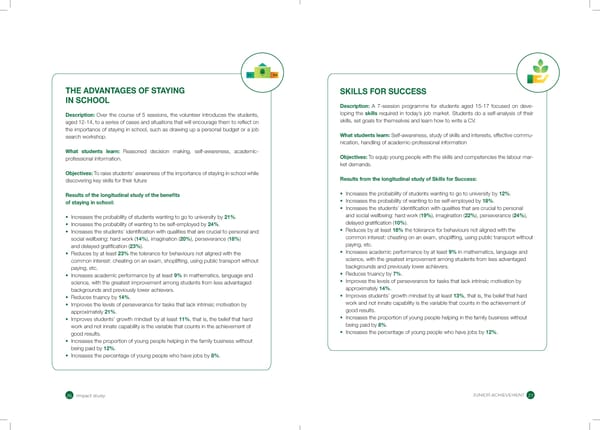THE ADVANTAGES OF STAYING SKILLS FOR SUCCESS IN SCHOOL Description: A 7-session programme for students aged 15-17 focused on deve- Description: Over the course of 5 sessions, the volunteer introduces the students, loping the skills required in today’s job market. Students do a self-analysis of their aged 12-14, to a series of cases and situations that will encourage them to re ect on skills, set goals for themselves and learn how to write a CV. the importance of staying in school, such as drawing up a personal budget or a job search workshop. What students learn: Self-awareness, study of skills and interests, effective commu- nication, handling of academic-professional information What students learn: Reasoned decision making, self-awareness, academic- professional information. Objectives: To equip young people with the skills and competencies the labour mar- ket demands. Objectives: To raise students’ awareness of the importance of staying in school while discovering key skills for their future Results from the longitudinal study of Skills for Success: Results of the longitudinal study of the bene ts • Increases the probability of students wanting to go to university by 12%. of staying in school: • Increases the probability of wanting to be self-employed by 18%. • Increases the students’ identi cation with qualities that are crucial to personal 19%), imagination (22%), perseverance (24%), • Increases the probability of students wanting to go to university by 21%. and social wellbeing: hard work ( • Increases the probability of wanting to be self-employed by 24%. delayed grati cation (10%). • Increases the students’ identi cation with qualities that are crucial to personal and • Reduces by at least 18% the tolerance for behaviours not aligned with the social wellbeing: hard work (14%), imagination (20%), perseverance (18%) common interest: cheating on an exam, shoplifting, using public transport without and delayed grati cation (23%). paying, etc. • Reduces by at least 23% the tolerance for behaviours not aligned with the • Increases academic performance by at least 9% in mathematics, language and common interest: cheating on an exam, shoplifting, using public transport without science, with the greatest improvement among students from less advantaged paying, etc. backgrounds and previously lower achievers. • Increases academic performance by at least 9% in mathematics, language and • Reduces truancy by 7%. science, with the greatest improvement among students from less advantaged • Improves the levels of perseverance for tasks that lack intrinsic motivation by 14%. backgrounds and previously lower achievers. approximately • Reduces truancy by 14%. • Improves students’ growth mindset by at least 13%, that is, the belief that hard • Improves the levels of perseverance for tasks that lack intrinsic motivation by work and not innate capability is the variable that counts in the achievement of 21%. good results. approximately • Improves students’ growth mindset by at least 11%, that is, the belief that hard • Increases the proportion of young people helping in the family business without 8%. work and not innate capability is the variable that counts in the achievement of being paid by good results. • Increases the percentage of young people who have jobs by 12%. • Increases the proportion of young people helping in the family business without being paid by 12%. • Increases the percentage of young people who have jobs by 8%. JUNIOR ACHIEVEMENT ׀ׄ٪ Impact study ׀ׅ
 Junior Achievement Foundation Page 13 Page 15
Junior Achievement Foundation Page 13 Page 15